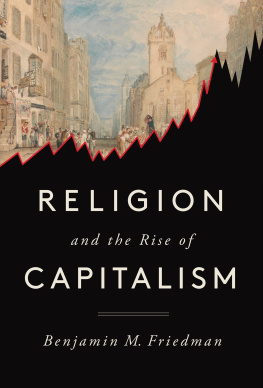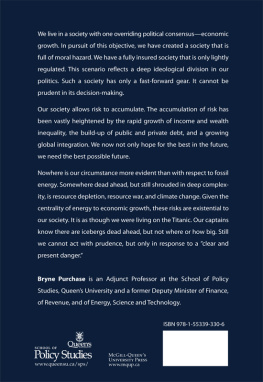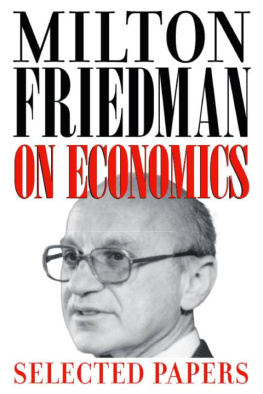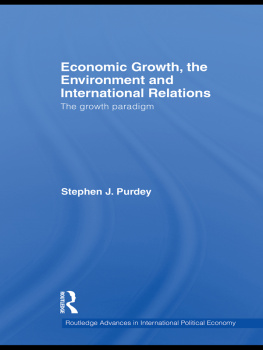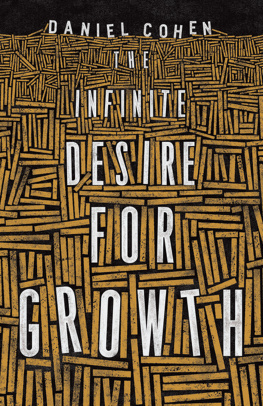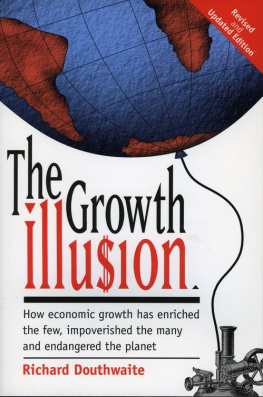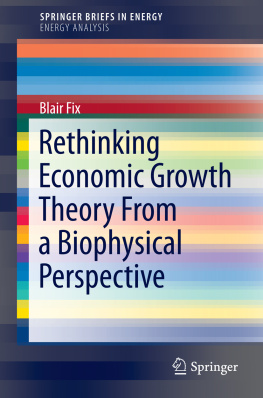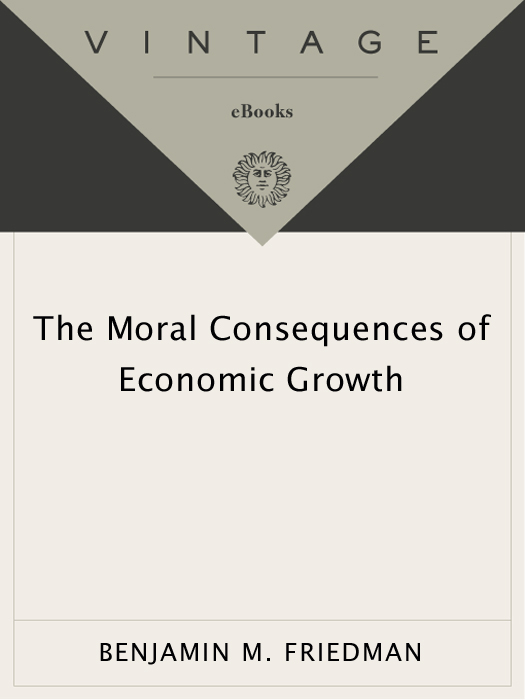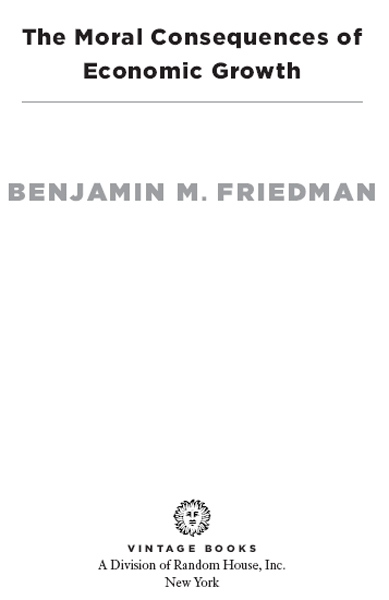Praise for Benjamin M. Friedmans
The Moral Consequences of Economic Growth
Fascinating. A compelling [case], backed up impressively by historical evidence. Belongs on the required-reading list of anyone hoping to improve the world.
The Philadelphia Inquirer
Persuasive. Friedman urgently and convincingly describes a society that is failing in many respects but is strangely unable to understand why. His analysis should be heeded. His book makes clear the moral consequences of economic growth in developed and developing nations.
The New York Review of Books
A powerful rebuttal to some of the conventional assumptions of this countrys governing elite. Friedman is a true scholar, and he scrupulously presents all sides of an argument and all the available evidence. His is wise counsel and a sober warning. Lets hope someone is listening.
American Prospect
Impressive. Sophisticated. A subtle, wide-ranging argument. A compelling case for why societies at all stages of development should strive to realize or sustain increases in living standards.
The New Leader
BENJAMIN M. FRIEDMAN
Benjamin M. Friedman is the William Joseph Maier Professor of Political Economy and former chairman of the Department of Economics at Harvard University, where he has taught for more than three decades. His book Day of Reckoning: The Consequences of American Economic Policy Under Reagan and After received the George S. Eccles Prize, awarded annually for excellence in writing about economics. He has written for The New York Times, The Wall Street Journal, and The New York Review of Books. He has been the recipient of the John R. Commons Award, presented in recognition of achievements in economics and service to the economics profession. He and his wife, Barbara, and their two sons live in Cambridge, Massachusetts.
Benjamin Friedman is represented by the Random House Speakers Bureau www.rhspeakers.com.
ALSO BY BENJAMIN M. FRIEDMAN
Day of Reckoning:
The Consequences of American Economic Policy Under Reagan and After
FIRST VINTAGE BOOKS EDITION, SEPTEMBER 2006
Copyright 2005 by Benjamin M. Friedman
All rights reserved. Published in the United States by Vintage Books, a division of Random House, Inc., New York, and in Canada by Random House of Canada Limited, Toronto. Originally published in hardcover in the United States by Alfred A. Knopf, a division of Random House, Inc., New York, in 2005.
Vintage and colophon are registered trademarks of Random House, Inc.
A portion of this work previously appeared in The Atlantic Monthly.
The Library of Congress has cataloged the Knopf edition as follows: Friedman, Benjamin M.
The moral consequences of economic growth / Benjamin M. Friedman.1st ed.
p. cm.
1. Economic developmentMoral and ethical aspects.
2. Income distribution. 3. Political participation.
4. Democracy. I. Title
HD82F7168 2005
174dc22 20045040792
eISBN: 978-0-307-77345-6
Author photograph J. D. Sloan
www.vintagebooks.com
v3.1
For B.A.C.
Contents
PART I
IDEAS, THEIR ORIGINS, AND THEIR IMPLICATIONS
PART II
DEMOCRACY IN AMERICA
PART III
OTHER TIMES, OTHER PLACES: THE EUROPEAN DEMOCRACIES
PART IV
DEVELOPMENT, EQUALITY, GLOBALIZATION, AND THE ENVIRONMENT
PART V
LOOKING FORWARD
Preface
Morality has many dimensions. In some contexts, the actions and attitudes we recognize as moral are mostly a matter of individual behavior. Personal honesty, fair dealing, family bonds, and loyalty to friends and co-workers would be on almost everyones list. Religious belief and practice would be on many peoples. Many would also add, now in a negative sense, aspects of sexual behavior, or use and abuse of drugs and alcohol.
This book is about how economic growthor stagnationaffects the moral character of a society. But here as well, what constitutes a moral society is a matter of many dimensions, and a question to which different people bring different conceptions.
The concept of a moral society that I take as the benchmark for examining what difference economic growth makes is the image held out by the Enlightenment thinkers whose ideas were key to the creation of America as an independent nation and have remained central to Western thinking ever since. Its crucial elements include openness of opportunity, tolerance, economic and social mobility, fairness, and democracy. Surely there are other valid conceptions of the moral society as well; but these are the characteristics that I keep in mind throughout, and against which I measure the progress or retreat that economic developments help bring about. I make no attempt here to argue why these characteristics of a society are desirable, much less moral. I take them to be so for the reasons Locke and Montesquieu, Adams and Jefferson, and political thinkers both theoretical and practical ever since, have recognized.
This book could have been written from any of a number of familiar viewpoints, and not just because different people might conceive the moral society differently. Beginning from the same benchmark, a historian, a philosopher, a psychologistnot to mention a theologiancould well treat this subject, and presumably would treat it differently. Although I have drawn on these disciplines along the way, I have nonetheless written from the perspective of an economist. After more than half a lifetime of study and research into policies designed to keep output and employment as close as possible to an economys existing potential, and to help that potential expand over time, I wanted to be able to say why this matters for countries (like my own) where the average income is already high and most people enjoy a comfortable standard of living. That is where this inquiry starts.
And, of course, I have written also from the perspective of my time and place. One of my Harvard colleagues with whom I once discussed in some detail the hypothesis about economic growth and moral progress that I advance here, a distinguished European scholar a decade and a half older than I, commented that only an Americanand at that, only an American of my generationwould write a book expressing such an optimistic perspective on economic growth from a moral point of view. If this is right, I gladly accept that identification as well.
BENJAMIN M. FRIEDMAN
Cambridge, Massachusetts
July 2005
PART I
IDEAS, THEIR ORIGINS, AND THEIR IMPLICATIONS
Chapter 1
What Growth Is, What Growth Does
Economic growth has become the secular religion of advancing industrial societies.
DANIEL BELL
The Cultural Contradictions of Capitalism
A re we right to care so much about economic growth as we clearly do?
For citizens of all too many of the worlds countries, where poverty is still the norm, the answer is immediate and obvious. But the tangible improvements in the basics of life that make economic growth so important whenever living standards are lowgreater life expectancy, fewer diseases, less infant mortality and malnutritionhave mostly played out long before a countrys per capita income reaches the levels enjoyed in todays advanced industrialized economies. Americans are no healthier than Koreans or Portuguese, for example, and we live no longer, despite an average income more than twice what they have. Yet whether our standard of living will continue to improve, and how fast, remain matters of acute concern for us nonetheless.


